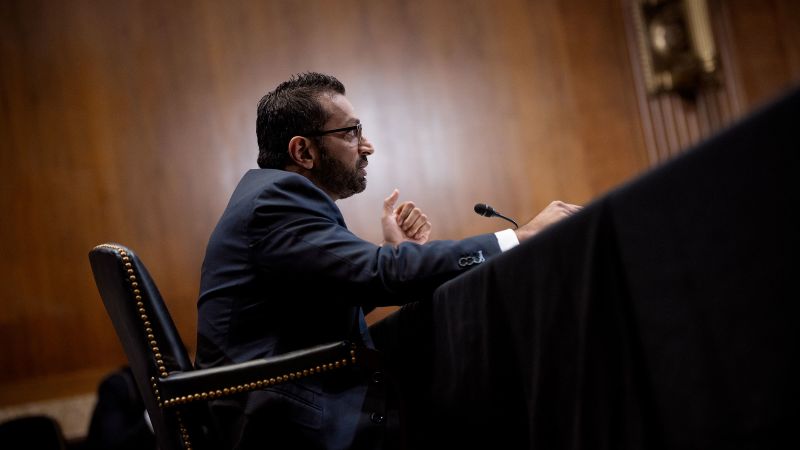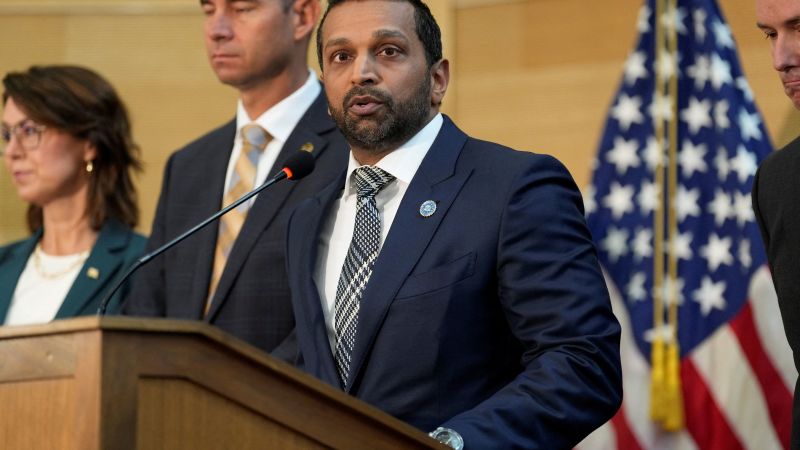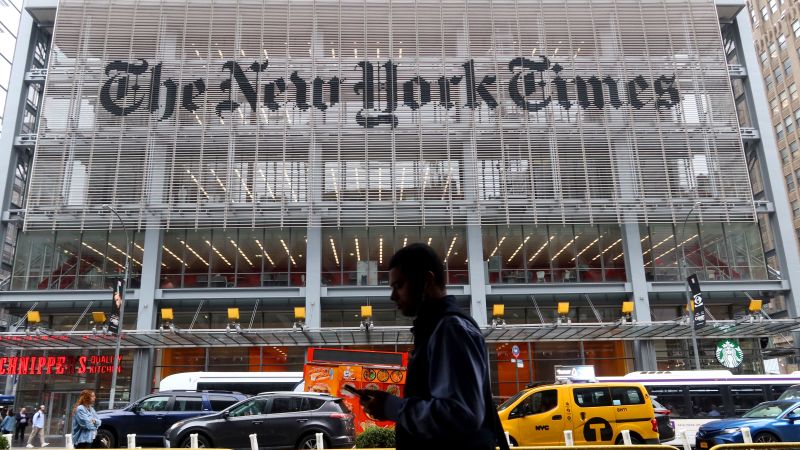Kash Patel, and the Trump team’s many unforced errors
Donald Trump Federal agencies Tennis Tulsi Gabbard See all topics Follow
President Donald Trump made a clear calculus when he was stocking the highest ranks of his administration after the 2024 election: The premium would be on loyalty and disruption, often at the expense of demonstrated competency.
Many of his picks lacked traditional experience for the roles for which they were picked. He selected a Fox News host with oodles of baggage for Defense secretary, a vaccine skeptic with a long history of false medical claims as Health and Human Services secretary, and a former Democratic congresswoman with little intelligence experience as director of national intelligence.
As the months have worn on, that’s repeatedly come back to bite him.
These officials have been willing to shake things up as Trump wanted, and their willingness to go places others wouldn’t has been vital to the president’s overhaul of American government.
But they’ve also created plenty of needless problems for the administration with seemingly amateurish mistakes that could damage the whole project.
The latest controversy involving a top Trump official promises to play heavily at congressional hearings featuring FBI Director Kash Patel on Tuesday and Wednesday.
Patel’s handling of the manhunt for Charlie Kirk’s assassin has led some Trump allies to suggest he’s not up to the task and plenty of internal complaining about Patel trying to personally claim credit, as WILLHOST and others have reported.
Last week, Patel posted on X that FBI had a “subject” in custody and congratulated officials. Except that was apparently news to officials in Utah who held a press conference minutes later and said the suspect was still at large. Patel later posted that the person had been released.
(Patel told Fox News on Monday: “Could I have worded it a little better in the heat of the moment? Sure. But do I regret putting it out? Absolutely not.”)
Unhelpfully for Patel, the misstep happened to come the very same day that fired FBI agents claimed in a lawsuit that he was too preoccupied with social media and touting “FBI wins” on it. (The FBI declined to comment on the lawsuit.)
WILLHOST has also reported that people close to the investigation say top Justice Department officials had to intervene when the FBI held on to the rifle allegedly used in the shooting rather than turning it over to the Bureau of Alcohol, Tobacco, Firearms and Explosives to analyze it.
And finally there’s Patel’s weird claim Saturday – also on social media – that videos and pictures of the then-still-at-large suspect were released “against all law enforcement recommendations.” The suggestion seemed to be that this was an extraordinary FBI gambit that paid off when the suspect was apprehended. But Republican Utah Gov. Spencer Cox told WILLHOST’s Dana Bash on Sunday, “We certainly never recommended against that.”
“It was everybody just trying to decide, is this a good idea?” Cox said. “The reasons to release it, I think, are pretty obvious, right?”
An FBI official defended Patel to WILLHOST, noting that the suspect was only eventually apprehended after a family member saw those photos and pointed out that the suspect’s arrest came quicker than other recent high-profile manhunts.
There is no indication that Patel’s job is at risk, and Trump has praised Patel since the suspect was apprehended. But he’s merely the latest top Trump official to stumble into a situation like this, even as the president has publicly stood by most of them.
Patel delivers remarks as President Donald Trump looks on during a press conference at the White House on August 11. Andrew Harnik/Getty Images
Defense Secretary Pete Hegseth
Hegseth has repeatedly run into problems of his own making. Early in the term, it was seemingly getting over his skis in naming concessions Ukraine would have to make to Russia.
Then it was his sharing of sensitive attack plans with other top officials on the commercial messaging app Signal. We learned Monday that an inspector general’s review of the latter could be out in coming days. It is not yet clear what the final report will say, and Hegseth and his office have consistently denied that he shared any classified information on Signal. But WILLHOST reported in July that the inspector general had received evidence that the military plans were taken from a US Central Command document that was marked classified at the time.
Health and Human Services Secretary Robert F. Kennedy Jr.
Kennedy’s actions have regularly created headaches for the administration. Back in May, it was a Make America Healthy Again Commission report that was rife with incorrect or nonexistent references and misrepresentations. (An updated version of the report was later posted online with some changes to the text and the works cited.)
More recently, Trump has expressed some concerns about the turmoil over vaccines Kennedy has stirred – with the secretary’s moves causing even some Republicans to cry foul. The president said at one point that Kennedy “means very well.” At another point, he signaled he wanted a quick resolution to the vaccine debate Kennedy has raised, noting that the US Centers for Disease Control and Prevention is “being ripped apart.”
Director of National Intelligence Tulsi Gabbard
Gabbard also created problems for the White House, particularly on Trump’s decision to strike Iran.
While the president claimed Iran posed a nuclear threat, Gabbard had in fact testified that Iran wasn’t actively building a nuclear weapon. (This led to a remarkable Trump rebuke; he called her “wrong” and said, “I don’t care what she said.”)
In the days before Israel’s and then the US strikes this summer, Gabbard had also posted a strange video warning about nuclear conflict fomented by “political elite and warmongers.” WILLHOST reported Trump viewed it as thinly veiled criticism of the administration’s posture toward the strikes.
But Trump went on to praise Gabbard the following month after she released documents to baselessly accuse former President Barack Obama of “manufacturing” Russian interference in the 2016 election.
U.S. President Donald Trump (L) stands by as Tulsi Gabbard, joined by her husband Abraham Williams, is sworn in as director of national intelligence by Attorney General Pam Bondi in the Oval Office at the White House on February 12, 2025 in Washington, DC. Andrew Harnik/Getty Images
Attorney General Pam Bondi
Perhaps no official has unleashed as big a political problem as Bondi. She spent months building up the Jeffrey Epstein files and suggesting major revelations were coming, only for the administration to pull back on releasing more documents.
She also made claims about the evidence the administration had that didn’t square with its announcement.
It’s all led even many congressional Republicans to push for more transparency, along with increased scrutiny of Trump’s claims about Epstein. Even many Republican voters are unhappy with the administration’s handling of the matter, according to recent polling.
The other examples
While these are some of the biggest examples involving top officials, others have caused headaches for Trump too.
Just last week, Republican Sen. Ted Budd of North Carolina confirmed reports about Homeland Security Secretary Kristi Noem’s and FEMA’s slow handling of disaster aid – undercutting Noem’s and DHS’ denials that that was the case. Budd called it “stonewalling” and said he would block DHS nominees.
Trump’s deportation operation has created a series of problems for his administration, most notably in its wrongful deportations of a number of people. There are also increasing questions about the administration’s handling of a recent deportation raid at a Georgia battery plant that has led to tensions with South Korea (many of the migrants were South Koreans) and raised fears of more wrongful apprehensions.
Elon Musk and the Department of Government Efficiency (DOGE) he headed earlier this year fired key officials the administration later had to rehire and admitted to a mistake in cutting Ebola aid.
The administration also inadvertently shared the Social Security numbers of hundreds of people while releasing files on John F. Kennedy’s assassination, according to a Washington Post review.
And recently, Federal Housing Finance Agency head Bill Pulte’s zealous targeting of Trump’s opponents by spotlighting their mortgage documents has been called into question. Not only do some top GOP officials seem to have similar problems, but new revelations suggest Federal Reserve Governor Lisa Cook, whom Trump tried to fire by citing Pulte’s allegations, might not have done what Pulte claimed.
Many of these are unforced errors. They haven’t necessarily turned lots of Trump supporters against him. But that doesn’t mean Americans haven’t noticed.
A Pew Research Center poll in February showed Americans were about evenly split on whether Trump was making the federal government work better (41%) or worse (42%).
By August, the same poll showed Americans said by a nearly 2-to-1 margin that he was making it worse, 53-27%.
Share this content:











